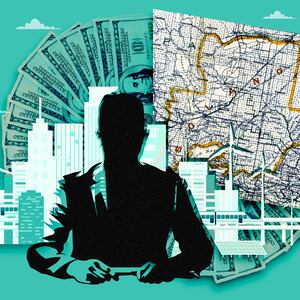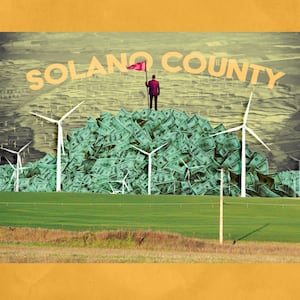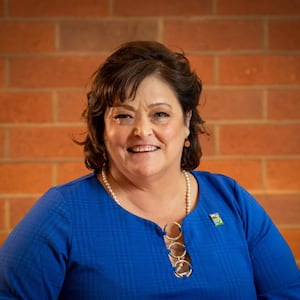When advocates for minority tenants in San Francisco rallied outside City Hall in May 2018 against legislation to allow aggressive development across the state, they were met with surprising resistance: dozens of young, mostly white counter-protesters, drowning them out with cries of “Read the bill!” The confrontation became so heated that a 77-year-old protester fainted and had to be taken to the hospital. One of the counter-protesters was escorted out of the crowd by sheriff’s deputies; another later issued a seven-paragraph apology on Twitter.
Many of the counter-protesters that day were members of California YIMBY—a group that advocates for rapid housing development in the Bay Area. The group had the backing of multimillionaires and billionaires, several of whom were revealed last week to be the same tech titans behind a secretive plan to build a new city in rural Solano County, just 60 miles outside San Francisco.
The coalition that quietly bought up 55,000 acres of land in Solano County—keeping their plans a mystery until last week—includes some of the biggest names in the tech sector and California political advocacy, including venture capitalists Marc Andreessen and Michael Moritz, Stripe co-founders John and Patrick Collison, and venture capitalist and California YIMBY co-founder Nat Friedman. After years of working on issues in San Francisco—and broadcasting their complaints about it on Twitter and in op-eds—the members seem to have decided it is time to start over.
ADVERTISEMENT
The project’s backers launched a website Thursday—branded “California Forever,” the name of their limited corporate partnership—that described the vision of a “new community, good paying local jobs, solar farms, and open space” in an agricultural area north of the Bay. The developers promised a utopia of sorts, with “homes of different sizes and price points integrated in the same walkable neighborhoods,” surrounded by an “agricultural green belt” and sustained by solar farms.
“Instead of watching our kids leave, we have the opportunity to build a new community that attracts new employers, creates good paying local jobs, builds homes in walkable neighborhoods, leads in environment stewardship, and fuels a growing tax base to serve the county at large,” the pastel-hued website enthused.
The project has already stirred controversy in the community, where the developers offered up to five times the market value for ranch lands in their proposed city. The group sued a few ranchers this spring, accusing them of an “illegal price-fixing conspiracy” in a dustup that locals told the San Francisco Chronicle had made some neighbors afraid of even speaking to one another. In other cases, the developers reportedly approached family members of ranchers who did not want to sell, hoping to convince them to auction off their piece of the land. “It was like a hostile takeover,” one rancher told the Chronicle. “It was Shakespearean, a Game of Thrones kind of thing.”
A review of the major investors in the project reveals a group of wealthy and powerful individuals with a strong sway in San Francisco politics and a particular focus on housing. Michael Moritz, a prominent Bay Area venture capitalist, sent around pitch decks for the new city as early as 2017, according to The New York Times. Until his retirement earlier this year, Moritz was a partner at Sequoia Capital, one of the highest-profile venture capital firms in the U.S., and he still serves on the board of Google, PayPal, Instacart, and the Collison brothers’ Stripe.
Originally from Wales, Moritz has lived in San Francisco for decades and is a fixture of local politics. His foundation CrankStart funds a political nonprofit called TogetherSF that pushes for a crackdown on drug dealing, a stronger police force, and higher-density housing development in the city, among other issues. The group stoked controversy with its brash anti-drug campaign this summer, which featured copy like, “In San Francisco drug dealers have more rights than your kids,” and the slogan: “That’s Fentalife!” The ads made their way to Fox News and caught the eye of California Gov. Gavin Newsom, who reportedly registered his discontent.
Moritz has been similarly unabashed about his personal qualms with the city, decrying “deserted downtowns,” failing school system, understaffed police departments, and “open-air drug markets and homeless encampments” in a Financial Times op-ed in February. In a New York Times op-ed that same month, titled “Even Democrats Like Me Are Fed Up With San Francisco,” Moritz complained that the city had become “subject to the tyranny of the minority” and suggested reforms from strengthening the power of the mayor’s office to reducing the number of ballot initiatives.

Michael Moritz
Michael Kovac/GettyA community activist who worked with Moritz in the past told The Daily Beast she was surprised to see his name among the Solano County project’s backers. Even if she did not always agree with his tactics, she said, “he is investing in what he sees as making San Francisco better so heavily.”
“Maybe he’s just making multiple bets, because he’s certainly continuing to follow San Francisco politics closely,” she said—then took a shot at the Solano County project. “How can Mike Moritz run politics in a new city when he can’t even run politics in an existing city?”
Another California Forever backer is Nat Friedman, the founder of two software companies and the former CEO of Github, who now works as a tech investor. On his personal website, Friedman writes that he believes it is “our right (maybe our moral duty) to reshape the universe to our preferences,” and declares it is “important to do things fast.”
He is also a vocal critic of the current state of affairs in San Francisco: In April, Friedman tweeted that he and his wife moved to Menlo Park after two “meth addicts” broke into his home and robbed him. “We didn’t want to leave SF—we love it there—but we have a young kid and it seemed irresponsible to stay in a place where drug addicts commit home invasions to the point where they are called ‘frequent flyers,’” he wrote.
Friedman is also the co-founder and chairman of California YIMBY, one of the groups that clashed with the protesters outside San Francisco City Hall in 2018. The YIMBY movement—a play on NIMBYism that stands for “Yes in My Backyard”—advocates for denser housing in cities to reduce urban sprawl and bring down housing costs. The movement recently became popular among tech leaders coming to terms with how their presence in the Bay Area has ratcheted up housing prices—to the point where their own workers are being pushed out. More than 100 tech leaders and CEOs—including Twitter’s Jack Dorsey and Lyft’s Logan Green—signed onto a YIMBY letter supporting the 2018 development bill.
Signatories included the Collisons, brothers who moved from Ireland to Silicon Valley after founding their first company and becoming millionaires at ages 19 and 17. They are major supporters of California YIMBY, donating $1 million in 2018. According to The New York Times, they also own 3 percent of the Solano County project. The Times also reported that Patrick Collison was the first person to invest in the project, after bonding with its founder, Jan Sramek, over both having lived in Zurich. (Sramek also briefly worked as a consultant for Stripe.)
Collison hints at his interest in California Forever on his personal website, where he advocates for more housing and muses about how investors can “encourage the creation of more cities.”
“It seems that the returns to entrepreneurialism in cities remain high: Hong Kong, Singapore, Dubai, and others, have improved the lives of millions of people and appear much more contingent than inevitable,” he writes. “Maybe there could be far more of them.”
Another investor, Andreessen, is also an advocate for development, if not an outright YIMBY. Once described as the “quintessential Silicon Valley venture capitalist,” Andreessen co-founded the internet provider Netscape before launching a powerful investment firm. In 2020, he wrote a widely shared blog post titled “It’s Time to Build,” in which he complained that America “can’t build nearly enough housing in our cities with surging economic potential” and “can’t build the cities themselves anymore.” But he also opposed development in his own wealthy San Francisco suburb, writing to the mayor and city council that he and his wife were “IMMENSELY AGAINST multifamily development” because it would decrease their home values and quality of life.

Cows graze on a parcel of land near Rio Vista, California, recently purchased by the California Forever members.
Justin Sullivan/GettyAndreessen is not the only California Forever member to be accused of hypocrisy. Mortiz’s TogetherSF and Stripe were major opponents to Proposition C, which would have increased taxes on high-earning businesses and individuals to fund permanent housing for people experiencing homelessness. And California YIMBY declined to support Proposition 10, a statewide ballot measure that would have allowed communities to expand rent control and was endorsed by Sen. Bernie Sanders as a way to drive down housing costs.
Shanti Singh, a housing justice advocate who has clashed with California YIMBY, said the Solano County project backers had a “classic” mentality of “don’t infringe on the market, don’t tax us, and let developers build housing wherever.”
“California has always been full of these ‘visionary’ titans of industry who built the state, and it kind of feels like they’re tapping into that,” she said. “It’s like, ‘Well, either get the government out of our way or we should be in charge of the government.’”
Even some YIMBY movement members have expressed reservations about the project.
“I think this is what happens when ‘move fast and break things’ runs up against the Californian regulatory environment,” said Jordan Grimes of the Greenbelt Alliance, an environmental organization that advocates for denser urban housing.
“As someone who works on [these issues] every day, it does feel like banging your head against the wall a lot of the time,” he added. “I’m not surprised that there are people looking for shortcuts. The unfortunate reality is that there aren’t any.”
Brian Brokaw, a spokesperson for California Forever, said the group “assembled a team of housing experts to design this project in partnership with the residents of Solano County.”
“We deliberately sought world-class experts who are also local to the Bay Area, with a deep connection to the area and a shared commitment to solving the region’s most important challenges,” he told The Daily Beast in an email. “Now the conversation begins, and we look forward to hearing feedback—from both supporters and skeptics—to begin the phase of work that matters most: engagement with Solano residents."
Other backers of the Solano County project include Andreessen Horowitz general partner Chris Dixon; entrepreneur and investor Daniel Gross, who often invests alongside Friedman; and venture capitalist John Doerr. Doerr is a major Democratic donor who served as an economic adviser to the Obama administration and an advocate against climate change.
California Forever investor Laurene Powell Jobs, founder of the Emerson Project and the widow of Apple co-founder Steve Jobs, has also pledged $3.5 billion to fight climate-change over the next decade.
Perhaps the least-known member of the group is Sramek, a 36-year-old former Goldman Sachs trader who left Wall Street a decade ago to start a pair of tech startups, one of which sold and the other of which folded. According to California Forever’s website, Sramek—who was born in the Czech Republic and attended Cambridge University and the London School of Economics—“fell in love” with Solano County on fishing trips and decided to fuse his affection for the area with his passion for “walkable, livable, and sustainable” towns and cities. Sramek has been serving as the face of the project in meetings with local legislators, and closed on a house in the county this week.
Rounding out the team is spokesperson Brian Brokaw, a political adviser to Newsom and former campaign manager for Kamala Harris’ successful attorney general bid, who has been described by The Guardian as a “top Democratic strategist in the state.” Brokaw also previously served as a spokesperson for former state Treasurer Phil Angelides, who now owns an investment company focused on “developing sustainable urban communities and clean energy projects.” Gabriel Metcalf, a city planner who previously headed up SPUR, a top Bay Area urban policy organization, is serving as a consultant. His LinkedIn currently lists him as “working on something great.”
The California Forever website says it is also working with a host of other consultants, civil engineers, landscape architects, ad agencies, and law firms to make the founders’ currently very vague dream a reality. According to the Times, the company has grown to approximately three dozen people. The group plans to launch offices in Vallejo, Fairfield, and Vacaville, and is attempting to assemble a community advisory board of Solano citizens. It’s also sending out a survey to every Solano household, in preparation for the county-wide vote that would be needed to approve the development.
Singh, the housing advocate, says she looks forward to watching how the project develops.
“It’s really funny to watch them be like, ‘Oh yeah, we’re going to build our own city,’” she said of the billionaire backers. “I don’t know how they’re even going to agree with each other!”









